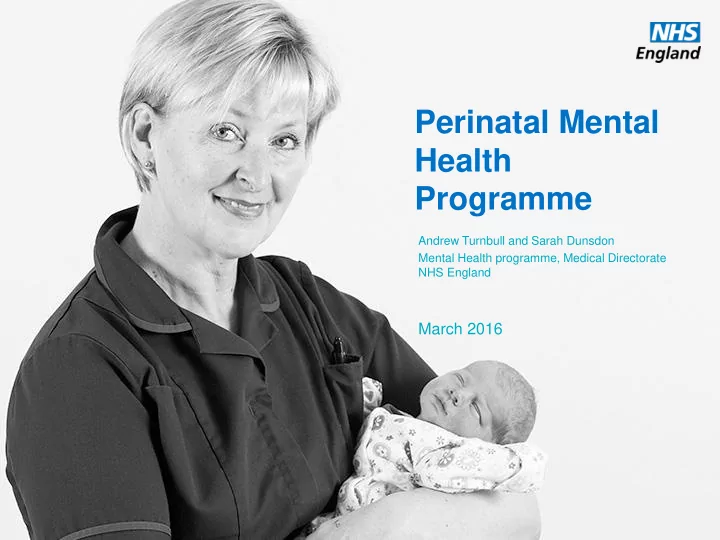

Perinatal Mental Health Programme Andrew Turnbull and Sarah Dunsdon Mental Health programme, Medical Directorate NHS England March 2016 www.england.nhs.uk
Background • Mental health problems in the perinatal period are very common, affecting up to 20% of women. Examples of these illnesses include antenatal and postnatal depression, obsessive compulsive disorder, post-traumatic stress disorder (PTSD) and postpartum psychosis. • Almost a quarter of women who died between six weeks and one year after pregnancy died from mental-health related causes. 1 in 7 women died by suicide. • Perinatal mental illnesses cost the NHS and social services around £1.2 billion for each annual cohort of births. A significant proportion of this cost relates to adverse impacts on the child. * LSE and Centre for Mental Health, The Costs of Perinatal Health Problems (2014) * MBRRACE-UK, Confidential Enquiries, 2015 2
Rates of perinatal psychiatric disorder per thousand maternities Maternal Mental Health Alliance estimated Postpartum psychosis 2/1000 prevalence numbers based on annual Chronic serious mental illness 2/1000 birth rates by CCG and the Joint Severe depressive illness 30/1000 Mild-moderate depressive illness and 100-150/1000 Commissioning Panel for Mental anxiety states Post traumatic stress disorder 30/1000 Health rates per 1,000 births Adjustment disorders and distress 150-300/1000 * Guidance for commissioners of perinatal mental health services, Joint Commissioning Panel for Mental Health, November 2012 3
Variation and Inequality • Perinatal Mental Health Specialist and Community Services variable and generally fragmented across the country. Fewer than 15% of localities provide specialist services for women with complex or severe conditions at the full level recommended in NICE guidance, and more than 40% provide no service at all. • NHS Benchmarking commissioned to undertake detailed analysis of access to specialist Mother and Baby Units across the country. Baseline 15 MBUs with 115 beds. Produced maps of the country showing distance travelled for women and their babies - significant gaps in local provision with some women having to travel over 100km to access a Mother and Baby Unit. * NHS Benchmarking mapping 2015 * Maternal Mental Health Alliance, Everyone’s Business campaign 4
Perinatal announcements • January 2016: Government announces additional £290m over next five years to 2020/21. • Builds on initial Spring Budget announcement, making total investment from 2015/16 to 2020/21 of £365m . • February 2016: Mental Health Task Force’s 5YFV for MH recommends additional investment so that by 2020/21, an additional 30,000 women in all areas of the country should receive access to evidenced-based specialist support, closer to their home, when they need it , including access to psychological therapies and right range of specialist community or inpatient care. • Enables NHS England to design a phased, five-year transformation programme to build capacity and capability in specialist perinatal mental health services, with the aim of enabling women in all areas of England to access NICE-concordant care by 2020/21. 5
Key publications and evidence base for change • Department of Health Publication: Closing the gap: priorities for essential change in mental health (2014) • The costs of perinatal mental health problems: LSE and Centre for Mental Health (2014) • Falling through the gaps: perinatal mental health and general practice, Centre for Mental Health (March 2015) • NICE, Antenatal and Postnatal Mental Health guidance (2014) and QS (Feb 2016) • MBRRACE-UK Confidential Enquiries into Maternal Deaths and morbidity (Dec 2015) • CMO annual report 2014: women’s health (Dec 2015) • CHIMAT needs assessment report (Dec 2015) • Mental Health Task Force (Feb 2016) • Independent Review of Maternity Services (Feb 2016) 6
Principles of Implementation • Collaborative commissioning and innovation with clinicians that improve outcomes and experience for women, their families and babies. • Flexible models that integrate specialist and community services aligning with maternity and children services. • Raising the quality and accessibility of services to women and their babies. • Measuring and evaluating the difference that investment has made in the local system. • Everyone in the system has a role in implementation and delivery, especially those who have lived experience. • Currently work in progress – will continue to share and engage to make sure we get this right. 7
Priorities - implementation Expert Reference Group recommends focus of early investment in MBU capacity, perinatal networks (NICE-recommended) and community specialist teams. 16 / 17 aim on setting the foundation for a new 5 year improvement programme with key targeted activities, including: Building MBU capacity round table discussions held in three regions in need of new services review of current MBU capacity National and regional benchmarking data and analytical support Establishing and strengthening regional Perinatal Mental Health Networks 8
Priorities - implementation Training and development of workforce – inpatient and community teams Development of clinical leadership capacity – trainee posts Increase in multi-disciplinary specialist community perinatal mental health teams National and quarterly learning events – engagement and involvement of voluntary organisations Establishment of a NHS Project Board for Perinatal Mental Health monitor progress and advise on allocation of finances that will support the development of community specialist services. 9
Priorities 16/17 – CCGs and providers • I dentify and assess baseline positions in terms of availability and access to specialist perinatal mental health services (in line with NICE guidance) in order to determine strategic plans for coming years and respond to availability of new funding. • Ensure that a broad range of perinatal mental health support is available locally, with clear pathways available for identification and timely access to psychological therapies and specialist perinatal services in line with NICE guidance. • Establish local workforce strategies for developing and strengthening the perinatal mental health workforce. • Collaborate through networks to deliver best practice and reduce fragmentation in service provision. 10
Recommend
More recommend